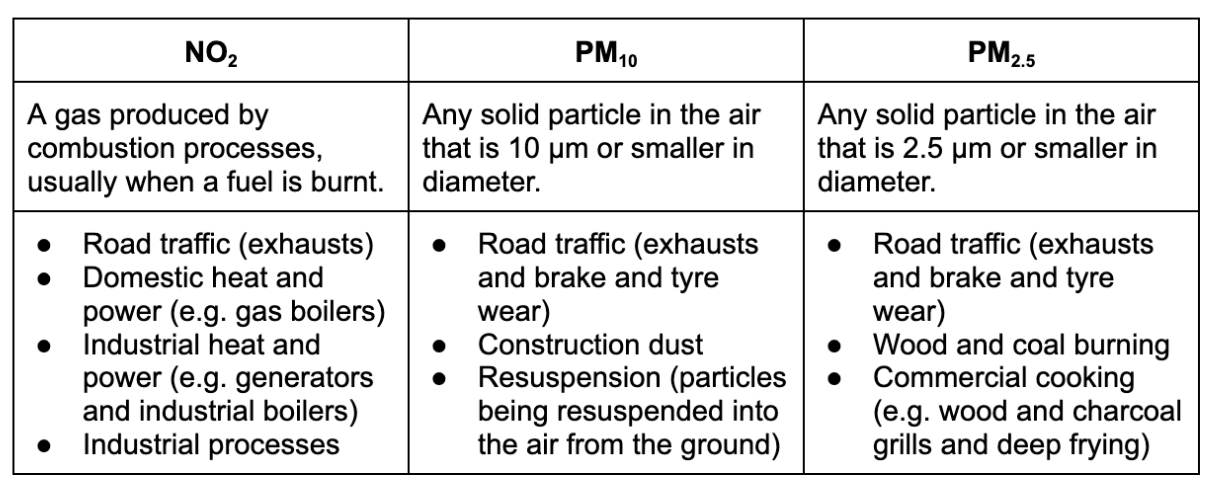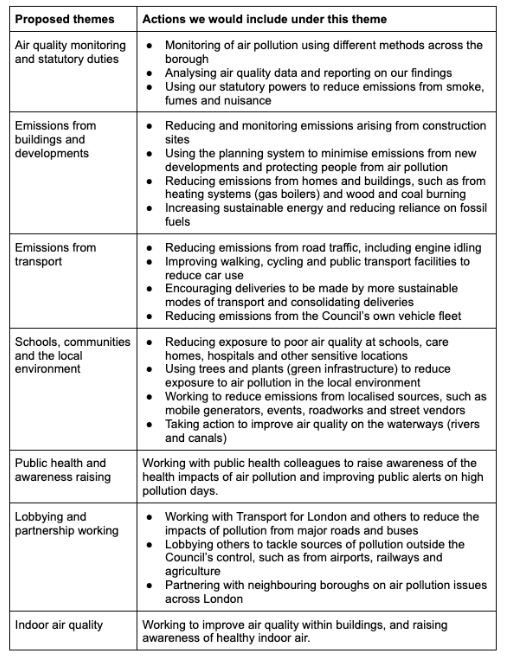Air Quality Action Plan Engagement (2026-2030)
Results updated 19 Feb 2025
Please find below the link to the final engagement report:
Files:
- Air Quality Action Plan - Early Engagement Report - Final.pdf, 1.9 MB (PDF document)
Overview

If you would like to skip straight to the survey without reading the information below, please CLICK HERE
Background
Air pollution is the largest environmental risk to health in the UK. The health effects of exposure to air pollution are wide-ranging and can affect everyone. They can particularly affect vulnerable groups such as children and the elderly. There is evidence that exposure to air pollution can:
- lead to or worsen asthma
- result in poor lung development in children
- contribute to diabetes, dementia and worsening mental health
The entirety of Hackney is an Air Quality Management Area (AQMA). The AQMA was first declared in 2006. An AQMA can be declared when levels of air pollution exceed certain legal limits, known as air quality standards and objectives. When an AQMA is declared, local authorities are obliged to produce an Air Quality Action Plan (AQAP). The AQAP outlines how the local authority will work to reduce levels of air pollution.
Hackney has had an AQAP in place since 2006, and the current AQAP was published in 2021. An AQAP must be reviewed at least every five years. Hackney Council is now looking to review its AQAP to ensure the Plan remains up-to-date.
You can review the current AQAP by visiting this link: https://hackney.gov.uk/air-quality-reports
Why we are engaging with residents and businesses
There are many pollutants which contribute to poor air quality, and these pollutants come from a wide range of sources. You can find out more in the ‘Air quality in Hackney’ box below. As a result, actions in the AQAP will cover many areas of the Council’s work. These include pollution control, transport, parking, planning, housing, schools and procurement. We understand that many people in Hackney may be affected by the actions that we take to reduce air pollution.
The new AQAP is in the very early stages of development. We would be interested in hearing from those who may be affected by - or who have an interest in - the actions we will take to improve air quality
What feedback can we take onboard?
At this stage, we can take on board suggestions and comments to shape the direction of the AQAP. We would be interested to receive feedback, suggestions and comments on:
- The actions we include in the AQAP, or the themes that help us organise these actions
- The specific measures we can take to help implement actions - these might have targets or outputs
- The extent or ambition of the AQAP (or the actions and measures within it)
The AQAP is a statutory document. It is produced under the requirements of the Environment Act 1995 and the London Local Air Quality Management framework. As such, there is guidance that we must follow in line with the Mayor of London and the Greater London Authority.
The Mayor of London directs London Boroughs to include a number of ‘priority’ actions. We must include these actions in our AQAP, although there is flexibility in how we implement these locally. More information on these actions is provided in the ‘LLAQM Borough Air Quality Action Matrix’ on the Mayor of London’s website.
There are some other limitations in what we can include in the AQAP. We must ensure the actions in the AQAP accord with other Council plans, policies and strategies. These include, for example, our Local Plan, Transport Strategy and Local Implementation Plan, Climate Action Plan and Procurement Strategy.
We must also ensure that the actions in the AQAP can be delivered across the Council.
What happens with your feedback?
Your feedback will be used to draft the AQAP. It will be collated into a report which will be published, explaining how feedback has been considered.
Once a draft AQAP has been produced, we will then undertake a statutory consultation. We will publish the draft AQAP and share with consultees, including businesses and residents, so that they can provide a response to it. We predict this statutory consultation will take place in spring 2025. We will then consider any further changes before publishing our final AQAP. The final AQAP will need to be formally approved by the Mayor of London’s office and adopted by Hackney Councillors.
We will report back on how this engagement and consultation process has shaped the AQAP.
Air quality in Hackney
Find out all about air quality in Hackney on our website.
The main air pollutants in Hackney are nitrogen dioxide (NO2) and particulate matter (which includes PM10 and PM2.5). The main sources of these pollutants in Hackney are as follows:
 These are the main sources of each pollutant, although there are other contributors.
These are the main sources of each pollutant, although there are other contributors.
There are also other pollutants that affect air quality. These include ozone (also known as photochemical smog), volatile organic compounds (VOCs - a wide group of different chemical compounds) and ammonia. The AQAP can also cover actions relating to these pollutants.
How air quality has changed
We have seen some significant improvements in air quality in recent years, but not for all pollutants.
Average levels of NO2 in Hackney have fallen around 45% since 2017. The most significant falls have been measured at busy roadside locations. Most of this reduction is due to lower emissions from road traffic vehicle exhausts. It is likely that this is due to newer, less polluting vehicles replacing more polluting older vehicles, as well as policies such as the Ultra Low Emission Zone (ULEZ).
Pollution reduced very sharply during the Covid-19 lockdowns. In Hackney, a ‘rebound’ of average levels of NO2 from traffic has not been observed.
However, levels of PM10 and PM2.5 have not reduced significantly in recent years. Measurements showed long-term reductions in PM10 until the mid-2010s. Since then, levels have neither increased, nor decreased, significantly. It is thought that decreases in emissions from road traffic exhausts have been offset by increases from other sources. These include construction dust, domestic wood/coal burning and brake and tyre wear from road traffic. An increase in heavier vehicles on the road may also be contributing to non-exhaust traffic emissions.
The Environment Act 2021 introduced more stringent targets for particulate matter in UK law. In addition, the latest World Health Organization guideline values (limits) are even stricter than UK law. This is due to new evidence on the health effects. A greater emphasis on particulate matter is therefore needed in the new AQAP, including non-traffic sources.
How the Air Quality Action Plan (AQAP) is organised
Actions in the current AQAP are organised into nine key themes. These themes help to ensure we are focusing on all of the important emissions sources and air quality issues. The themes can also be useful starting points when deciding on new actions.
Each theme includes actions. Actions describe the broad activities we will do to deal with an air quality issue that we have identified. As part of an action, we will identify measures. These are specific steps that we will take to progress the action.

We are proposing to amend our themes in the revised AQAP. These proposed themes are listed below. We have also provided a general summary of the actions we propose to include under each of the themes. These are very broad but may help when proposing or suggesting new actions.

What this survey is about
We have begun work on what we should include in the new AQAP. However, we would like to seek your views on:
- What you think works, or does not work, in our current AQAP
- The themes, actions and measures that could help shape the draft of our new AQAP
The following survey will take approximately 15 minutes to complete.
If you require this document in a different format, please email landwaterair@hackney.gov.uk We will consider your request and get back to you in the next five working days.
If you would like to provide a more detailed response, we also welcome additional written submissions via email at landwaterair@hackney.gov.uk
Interests
- Understanding views

Share
Share on Twitter Share on Facebook